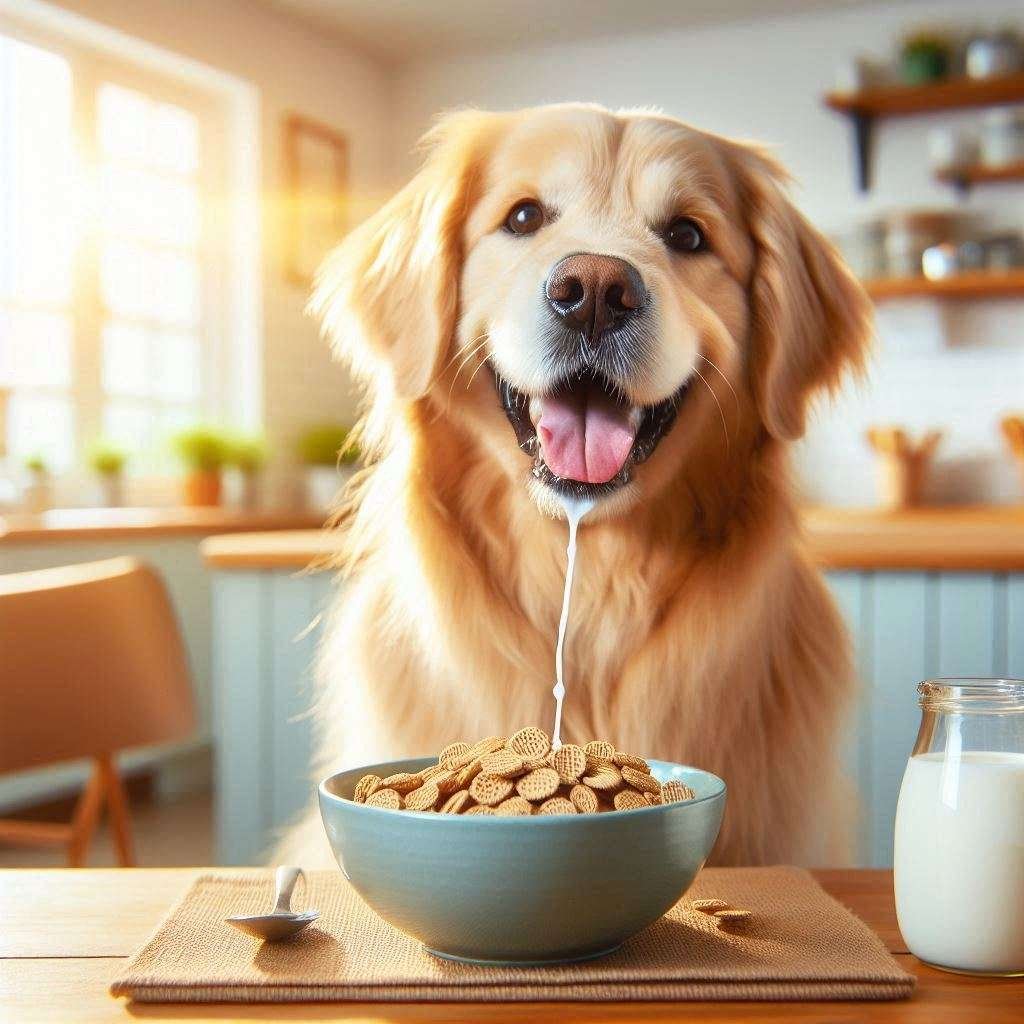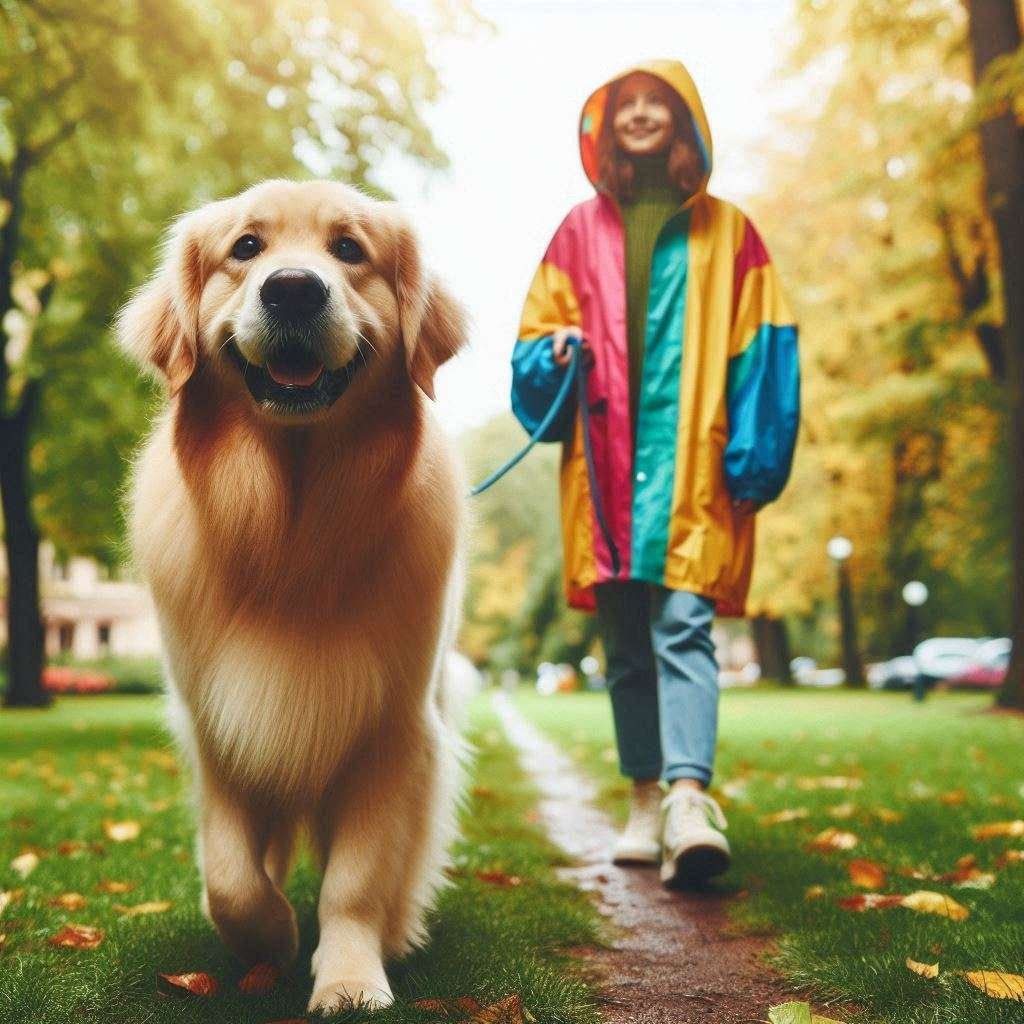Pumpkin season is here, and pet owners might wonder if their dogs can enjoy it. Dogs can safely eat pumpkin seeds in small amounts. While pumpkin seeds are good for humans, they don’t offer the same benefits for dogs. But, they can be a treat sometimes, if given in the right amount and prepared correctly. But can dogs eat pumpkin seeds?
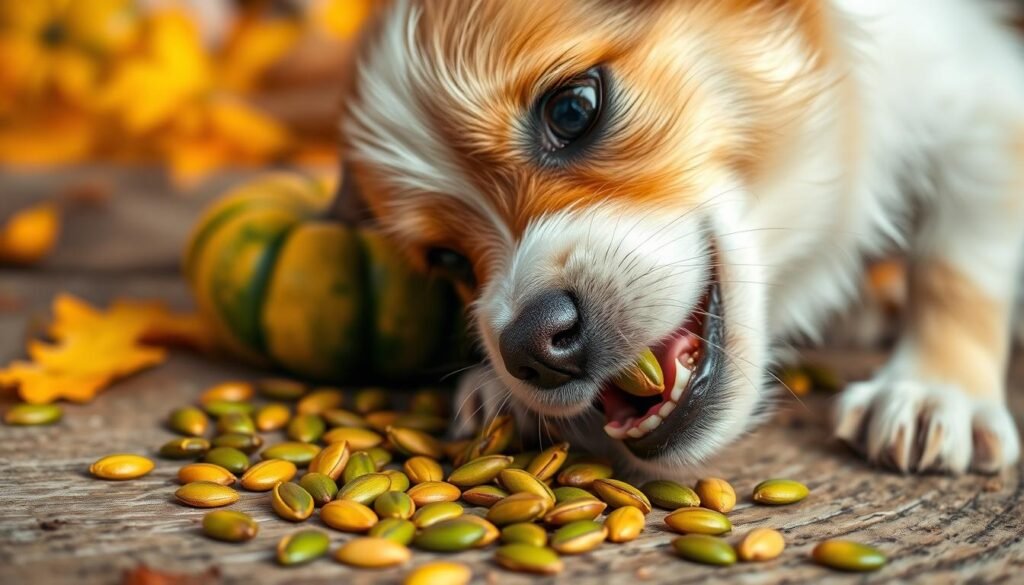
Key Takeaways
- Pumpkin seeds are generally considered safe for dogs to eat in moderation.
- Pumpkin seeds do not provide the same health benefits for dogs as they do for humans.
- Preparing pumpkin seeds properly, such as roasting them, is important for dog consumption.
- Feeding pumpkin seeds in moderation is key, as overconsumption can lead to digestive issues.
- Consulting a veterinarian is recommended before introducing pumpkin seeds to a dog’s diet.
Introduction: Exploring Pumpkin Seeds for Dogs
Pumpkin seeds are a favorite snack for humans. But can they be good for our dogs too? This section looks at the good and bad of giving pumpkin seeds to dogs.
Overview of Pumpkin Seeds and Their Nutritional Value
Pumpkin seeds are full of good stuff like vitamins, minerals, and antioxidants. They offer pumpkin seed benefits for dogs like protein, healthy fats, and fiber. They also have zinc, magnesium, and iron, making them a great snack for dogs.
Potential Benefits and Risks of Feeding Pumpkin Seeds to Dogs
Pumpkin seeds are good for humans, but dogs might not get as much benefit. Some pumpkin seeds safety for dogs benefits include:
- Helping with digestion and bowel health because of fiber
- Offering anti-inflammatory and antioxidant benefits for health
- Possibly helping to get rid of internal parasites like tapeworms
But, there are risks too. Too many dog dietary supplements like pumpkin seeds can upset a dog’s stomach. Some dogs might also be allergic to them.
Start with small amounts of pumpkin seeds and watch your dog closely. Talking to your vet is also a good idea to make sure pumpkin seeds are safe for your dog.
Are Pumpkin Seeds Safe for Dogs?
Pumpkin seeds are often seen as a healthy snack for dogs. But, it’s important to know how well dogs can digest them. These seeds have many good nutrients, but dogs might not get all of them.
Eating too many pumpkin seeds can upset a dog’s stomach. It might cause constipation or diarrhea.
Understanding Dogs’ Ability to Digest Seeds
Pumpkin seeds are hard for dogs to digest. The right amount depends on the dog’s size. Small dogs can safely eat three to five seeds, medium dogs five to 10 seeds, and large dogs 10 to 20 seeds a day.
Feeding too many seeds can upset a dog’s stomach. This can lead to bad digestion problems.
Debunking the Myth: Do Pumpkin Seeds Really Deworm Dogs?
Vets say pumpkin seeds don’t really deworm dogs. They might help worms pass through a dog’s system, causing diarrhea. But, they’re not a good deworming solution.
Vets should be consulted for the right deworming treatment. They can give the right medicine.
When giving pumpkin seeds to dogs, take off the shells. They can choke on them or not digest them. Grinding the seeds into a powder can help with digestion. But, pumpkin seeds should only be 10% of a dog’s daily food.
Pumpkin seeds are okay for dogs in small amounts. But, watch how your dog reacts. If they show signs of sickness, like vomiting or diarrhea, see a vet.
Dogs with sensitive stomachs or allergies might not do well with pumpkin seeds. Always talk to a vet before adding them to your dog’s diet.
can dogs eat pumpkin seeds
Moderation is Key: How Many Pumpkin Seeds Can Dogs Eat?
Dogs can safely enjoy dog-friendly pumpkin seeds in small amounts. The right amount depends on the dog’s size. Small dogs can have 3-5 seeds, medium dogs 5-10 seeds, and large dogs 10-15 seeds.
Feeding too many pumpkin seeds can upset your dog’s stomach. It can cause constipation or diarrhea. Pumpkin seeds are good for dogs, but only in small amounts.
Pumpkin seeds are full of nutrients like magnesium and omega fatty acids. They help with bladder health and the digestive system. They also improve skin and coat quality. But, they have a lot of fat, so they should be given carefully to avoid pancreatitis.
When giving pumpkin seeds to dogs, remove the shells first. You can grind, bake, or roast them. This makes them easier for your dog to chew and digest. Don’t add salt or seasonings, as they can harm your dog.
Even though pumpkin seeds are safe for dogs, watch how they react. If you’re worried, talk to your vet about the risks of pumpkin seeds for dogs. Giving them in moderation is best to keep your dog healthy.
Preparing Pumpkin Seeds for Your Furry Friend
When you want to give pumpkin seeds to your dog, it’s important to prepare them right. Pumpkin seeds are full of good stuff like vitamins, minerals, and fiber. These can help your dog stay healthy.
Removing the Shells and Roasting Instructions
First, take off the hard outer shells of the pumpkin seeds. This is because they can be a choking hazard. You can remove them by hand or with a small knife.
After removing the shells, roast the seeds at 350°F for 10-15 minutes. This makes them taste better and feel softer. But remember, don’t add any oils, salts, or seasonings. These can be bad for your dog.
Grinding Pumpkin Seeds for Easier Digestion
Another way to give pumpkin seed treats for dogs is to grind them into a fine powder. This makes them easier for your dog to digest. It’s good for older dogs or those with sensitive stomachs.
You can mix the pumpkin seed powder into homemade dog treats. Or, you can sprinkle it on their regular food. This way, you give your dog a tasty and healthy snack.
Potential Risks of Overfeeding Pumpkin Seeds
Pumpkin seeds can be a safe treat for dogs sometimes. But eating too many can upset their stomach. It can also cause constipation, diarrhea, and even pancreatitis because of the fat.
It’s important to only give the right amount. Watch how your dog reacts to pumpkin seeds in their food.
Pumpkin seeds have good fats for skin and coat health. But too many can upset their digestion. It’s best to not overdo it with pumpkin seeds.
The high fiber in pumpkin seeds can also be a problem. Too much fiber can cause constipation or diarrhea. This can make your dog uncomfortable.
Start with small amounts and watch how your dog does. This ensures they can handle the new food.
To avoid choking hazards, grind or cut pumpkin seeds small. This makes them easier for your dog to digest. Always check with your vet for the right amount and how often to give it.
While pumpkin seeds are good, don’t overdo it. Knowing the risks and following guidelines helps. This way, you can give your dog the benefits of pumpkin seeds safely.
Pumpkin: A Fiber-Rich Alternative for Dogs
If you want to boost your dog’s fiber and nutrient intake, pumpkin puree or pulp is a great choice. Pumpkin is packed with fiber, vitamins, and minerals. These can help keep your dog’s digestive system in check and offer other health perks.
Benefits of Pumpkin Puree and Pulp for Dogs
Pumpkin puree can be a tasty, nutritious treat for your dog. The pulp from carving a pumpkin is also safe for them. Pumpkin is full of important nutrients like:
- Vitamins A, C, and E
- Iron
- Potassium
These nutrients support your dog’s health and well-being. The fiber in pumpkin also helps with constipation and diarrhea. It adds bulk to the stool, making digestion easier.
| Nutrient | Benefit |
|---|---|
| Fiber | Helps regulate digestion, preventing constipation and diarrhea |
| Vitamins and Minerals | Supports overall health and immune system |
| Water Content | Keeps your dog hydrated and promotes healthy skin and coat |
When adding pumpkin to your dog’s diet, use pure, unsweetened pumpkin only. Canned pumpkin might have sodium or sugar, which are bad for dogs.
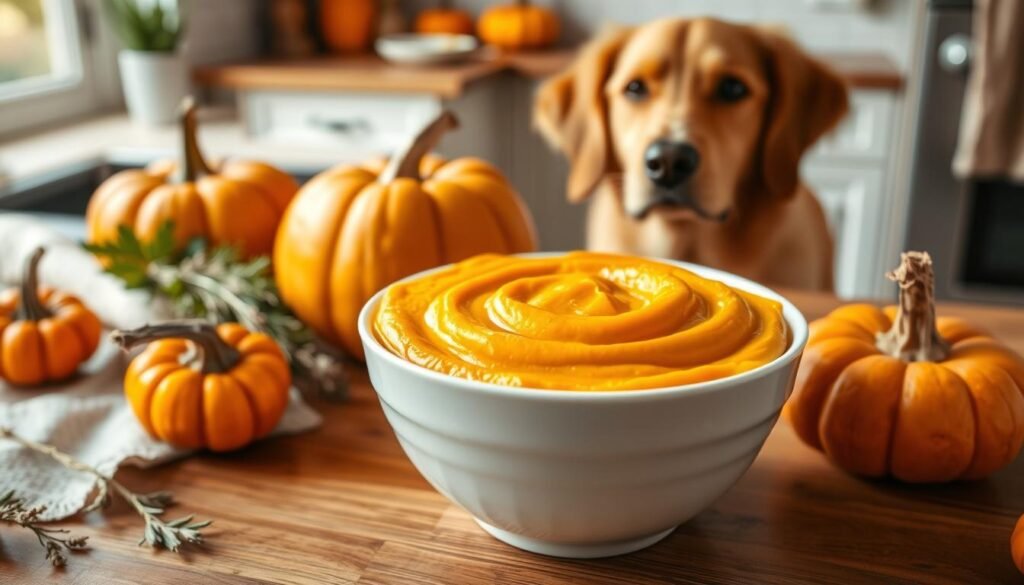
Talk to your vet about how much pumpkin to give your dog. Too much can cause diarrhea, weight loss, gas, and bloating.
Incorporating Pumpkin Seeds into Homemade Treats
Looking to boost your dog’s diet? Try adding pumpkin seeds to homemade treats. They’re full of omega-3 and omega-6 fatty acids. These are good for your dog’s skin, coat, and health. Plus, they have protein, fiber, and important vitamins and minerals.
Delicious and Nutritious Pumpkin Seed Treat Recipes
Making pumpkin seed treats at home is a great idea. It gives your dog a healthy snack they’ll enjoy. Here are some tasty recipes to try:
- Pumpkin Peanut Butter Frozen Treats – Mix pumpkin puree, peanut butter, and pumpkin seeds for a creamy, frozen treat.
- Peach and Pumpkin Cobbler Treats – Combine diced peaches, pumpkin seeds, and a bit of cinnamon for a sweet and crunchy snack.
- Pumpkin Oatmeal Spice Dog Treats – Bake these wholesome treats with oats, pumpkin seeds, and warm spices.
When making these recipes, follow the instructions closely. You might want to grind the pumpkin seeds for easier digestion. Always introduce new foods slowly and in small amounts to watch for any reactions.
“Pumpkin seeds are a fantastic source of omega-3 and omega-6 fatty acids, which can benefit your pup’s skin, coat, and overall health.”
Adding pumpkin seeds to homemade treats is a great way to give your dog a tasty and healthy snack. It supports their overall well-being. Just remember to talk to your vet before changing your dog’s diet.
Allergies and Sensitivities: Monitoring Your Dog’s Reaction
When you introduce pumpkin seeds to your dog, watch their reaction closely. Some dogs might have allergies or sensitivities. This could cause stomach problems like vomiting or diarrhea. Start with a small amount and watch how your dog reacts before giving more.
If your dog seems uncomfortable, tired, or has bowel changes, stop feeding them. Talk to your vet right away. Every dog is different, and it’s key to watch what works best for them.
- Pumpkin seeds are full of good stuff like vitamin C, vitamin E, iron, antioxidants, and zinc. These can help dogs when eaten in small amounts.
- The fiber in pumpkin seeds helps with digestion and keeps bowel movements regular.
- Pumpkin seeds might help dogs feel full longer, which can help with weight control.
- The vitamins and healthy fats in pumpkin seeds can make a dog’s coat shiny and healthy.
- Antioxidants in pumpkin seeds boost a dog’s immune system by fighting off harmful free radicals.
- Minerals like zinc and iron in pumpkin seeds support joint health and mobility.
Pumpkin seeds have many benefits, but it’s important to watch your dog’s reaction. Always talk to your vet before adding them to your dog’s diet. This way, you can make sure your dog stays healthy and happy.
“Moderation is key when feeding pumpkin seeds to dogs. It’s important to start with small amounts and closely observe your pet’s reaction before increasing the portion size.”
Consulting with Your Veterinarian
Before adding pumpkin seeds or any new food to your dog’s diet, it’s wise to consult with your veterinarian. Your vet can give advice based on your dog’s breed, size, age, and health. They ensure pumpkin seeds are safe and right for your dog. They also guide on how much to feed and any risks or interactions.
Pumpkin seeds are good for humans, full of vitamins and minerals. But, feeding them too much can upset your dog’s stomach. Vets say pumpkin seeds won’t naturally deworm dogs, despite what some claim.
Your vet can tell you how much pumpkin seeds to give your dog, if any. They might also suggest pumpkin puree or pulp as a fiber-rich alternative. This can offer similar benefits without stomach problems.
“It’s crucial to consult a veterinarian before introducing new foods into the dog’s diet,” explains Dr. Emily Smith, a board-certified veterinary nutritionist. “High-quality, balanced dog food does not need to be supplemented with pumpkin seeds according to veterinarians.”
Working with your vet ensures diet changes are safe and good for your dog. Their knowledge helps you understand dog nutrition and avoid health risks.
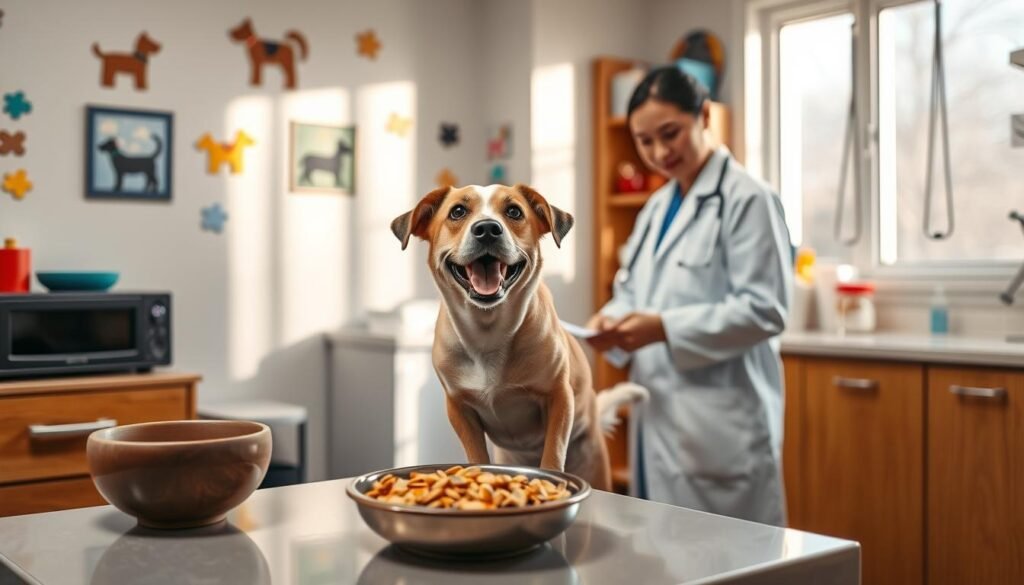
Pumpkin Seeds vs. Pumpkin: Which is Better for Dogs?
Choosing between pumpkin seeds and pumpkin for your dog can be confusing. Pumpkin might be better for most dogs.
Pumpkin seeds are okay as an occasional treat for dogs. But, they don’t offer much nutrition. On the other hand, pumpkin is packed with fiber, vitamins, and minerals. These can greatly improve your dog’s health.
- Pumpkin helps with digestion, preventing diarrhea or constipation.
- It’s full of vitamins A, E, and C, and minerals like potassium, copper, and iron. These are key for your dog’s immune system, vision, skin, and coat.
- The antioxidants in pumpkin, like carotenoids, can lower cancer and disease risks in dogs.
Pumpkin beats pumpkin seeds in nutritional value for dogs. While pumpkin seeds are safe sometimes, pumpkin is better for your dog’s health.
“Pumpkin is a great source of soluble fiber, which can help with digestive issues in dogs, such as diarrhea or constipation. It’s also rich in vitamins and minerals that support overall health.”
Start with small amounts of pumpkin, like 1-4 tablespoons of canned puree. Watch for any bad reactions. Pumpkin’s nutritional benefits make it a great choice for your dog.
Fun Facts About Pumpkin Seeds and Dogs
Pumpkin seeds may not be a big deal for dogs’ nutrition, but they have some perks. They have fiber that helps with digestion and antioxidants for protection. Plus, their nutty taste can be a fun treat for dogs.
Did you know pumpkin seeds can help with inflammation in dogs and cats? They also have magnesium for better breathing and urinary health. Omega fatty acids in them support skin, joints, heart, and brain health.
Pumpkin is packed with nutrients for dogs. One cup of cooked pumpkin has lots of Vitamin A, calories, sugar, potassium, and fiber. It also has antioxidants and minerals like Vitamin C, Iron, and Zinc, which are good for dogs.
But, don’t overdo it with pumpkin seeds. Small dogs can have 3-5 seeds a day. Medium dogs can have 5-10, and big dogs can have 10-20. Too many can upset their stomach.
Always talk to your vet before adding new foods like pumpkin seeds to your dog’s diet. This way, you can make sure they’re getting the best nutrition and a tasty treat.
Conclusion
In conclusion, pumpkin seeds can be a safe treat for dogs if given in small amounts. They offer a tasty snack but don’t have as many health benefits as for humans. Pumpkin puree or pulp might be better for adding fiber and nutrients to your dog’s diet.
Always talk to your vet before giving your dog new healthy snacks. They can help decide how much and how often to give pumpkin seeds. This ensures your dog stays safe and healthy.
Remember, only give pumpkin seeds in small amounts. Too much can upset your dog’s stomach. With careful feeding, pumpkin seeds can be a great addition to your dog’s meals.

